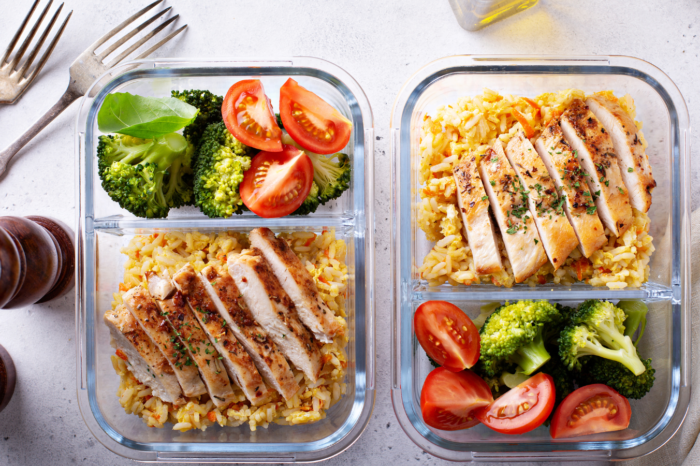written by Grace Farruggio
The Struggle of Eating Healthy with a Hectic Life
Does your busy schedule prevent you from preparing yourself daily meals? Our busy lifestyles can often interfere with our eating habits and the quality of food we put into our bodies. We tend to go for whatever is quickest and most accessible. Unfortunately, the simplest option is not always the healthiest. On the bright side, there is a solution that can simplify your life and create sustainable change in your nutrition. Meal planning and prepping have been shown to solve the issue of time scarcity leading to a healthier diet and better overall health!
Eating Out vs. Home-Cooked: The Health Divide
In the United States, the percentage of a person’s diet that consists of food prepared away from home has been increasing steadily over the past century. People whose diets mainly consist of foods prepared at home usually have greater amounts of fruits, vegetables, vitamins, and fiber. Cooking your own meals also allows you to avoid the high levels of additional sugars, fats, and sodium found in most prepared foods.
Meal planning and prepping reduce the amount of time needed to make meals throughout the week. Once you have planned and prepared your meals for the week, the time required to make them is significantly reduced. This leaves you with a healthy, delicious meal and more time for other responsibilities. Meal prepping will also allow you to improve your cooking skills and develop simple recipes that your family can grow to love!
Another benefit of meal planning is that it allows you to develop healthy eating patterns. In addition to planning what is in your meals, consider scheduling the times when you will eat your meals. Like abrupt changes in sleep, erratic eating patterns can negatively affect the body. Eating each meal at a consistent time every day establishes a strong circadian rhythm. A robust circadian rhythm can decrease the risk of obesity, diabetes, and heart disease.
While there is no proven best meal timing schedule, researchers have found that these three things can be key to maintaining good health:
- a consistent daily eating duration of fewer than 12 h per day
- eating most calories in the earlier part of the day
- avoiding food intake close to bedtime, in the middle of the night, or very early morning when melatonin levels are high
Step-by-Step: Kickstarting Your Meal Planning Journey
Here are a few quick tips on how to get started with meal planning and prepping:
1. Get a planner or calendar
In order to plan out your daily meals and stay organized, think about getting a daily planner. This will help you map out meals, decide when to do weekly preparation, and assign times to shop for groceries. Staying organized can relieve much of the stress of meal planning and practicing healthy eating patterns.
2. Select a time to plan out meals
To stay organized, pick a time each week to plan out your meals for the coming week. Prioritizing this step as a part of your weekly routine will simplify the process and ensure that you maintain the habit of meal prepping.
3. Plan your grocery shopping based on your weekly meals
It is a simple truth that without the right ingredients, you cannot prepare tasty meals. Make a list of all the ingredients that you will need throughout the week. Planning your shopping ahead of time will decrease the number of trips to the grocery store and save you time once you are there.
4. Do the time-consuming preparation at the beginning of your week
The key to meal prepping is doing as much preparation as possible beforehand. This includes any chopping, seasoning, and cooking that can be done in advance. Doing these tasks ahead of time will reduce the number of steps and make the cooking process much faster.
Quick Tip: An organized refrigerator can be crucial to achieving simple and stress-free cooking. Consider labeling containers by meal/day and reorganizing your fridge in a way that will make it easy to find ingredients. Less clutter in your refrigerator will also reduce stress during the cooking process
Embrace Meal Planning for a Healthier Tomorrow
While the benefits of meal planning are clear, it can be difficult to get started. These few steps will help you begin, but to create long-term lifestyle changes, you might want to consider getting individualized recommendations. Meal planning and prepping is one simple step that will encourage a healthier diet and save you time each week. It can also give you an opportunity to get creative in the kitchen and try new foods.



